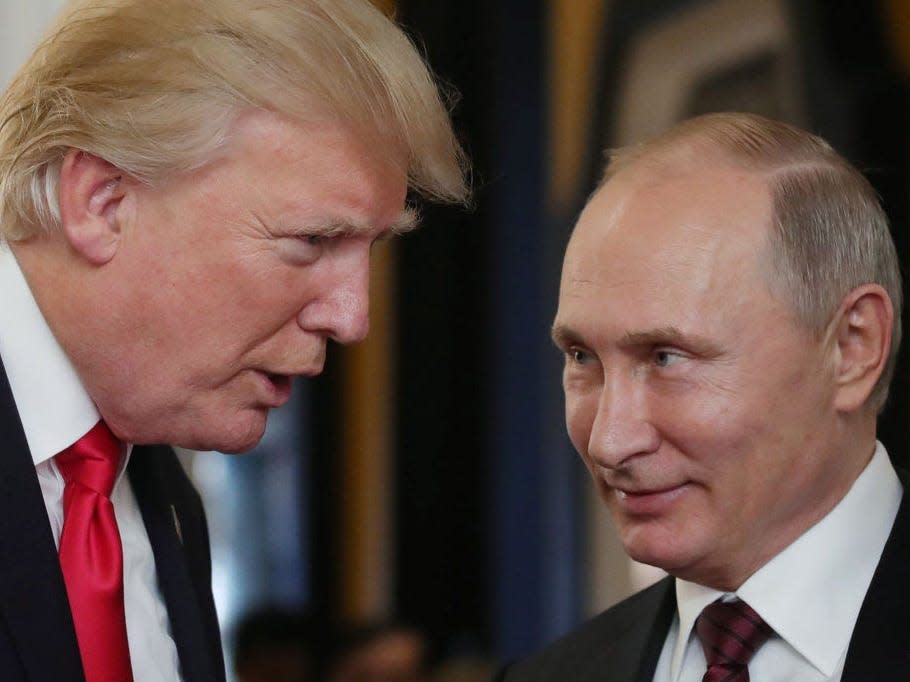Biden pressed Putin on SolarWinds hack, Navalny, and the bounty plot on US soldiers in first call with Russian leader

- Oops!Something went wrong.Please try again later.
- Oops!Something went wrong.Please try again later.
- Oops!Something went wrong.Please try again later.
President Joe Biden on Tuesday spoke to Russian President Vladimir Putin for the first time as commander-in-chief.
Biden pressed Putin on an array of topics, including Russian election interference.
The president has pledged to be more assertive with Putin than his predecessor, President Donald Trump.
President Joe Biden on Tuesday spoke with Russian President Vladimir Putin on the phone for the first time since his inauguration, raising a number of topics of concern for the US, according to a readout of the call from the White House.
The president pressed Putin on "the SolarWinds hack, reports of Russia placing bounties on United States soldiers in Afghanistan, interference in the 2020 United States election, and the poisoning of Aleksey Navalny." The Russian government has denied any involvement in the above issues.
Navalny, who is Putin's most prominent critic, was recently arrested in Moscow after returning to Russia from Germany, where he was receiving treatment after being poisoned last August in Siberia. There have been mass protests in Russia over Navalny's arrest. The Biden administration has called on the Russian government to release Navalny and people arrested in protest of his detention.
Biden in his call with Putin also emphasized US support for Ukrainian sovereignty amid Kiev's ongoing war with Kremlin-backed separatists in eastern Ukraine, the readout said, as the two leaders discussed their willingness to extend the New START nuclear arms control treaty for five years. They agreed to "have their teams work urgently to complete the extension" of the treaty by February 5.
New START places limitations on the number of of strategic nuclear warheads, missiles, and bombers that can be deployed by each country. It's the only remaining nuclear arms control treaty between the US and Russia, who have the world's largest nuclear arsenals.
According to a Kremlin summary of the call, Putin congratulated Biden "on the start of his term as US President," and emphasized that normalization of relations between the US and Russia would be in the interests of both countries as well as the international community.
"In general, the conversation between the Russian and US leaders was businesslike and sincere. They agreed to maintain contact," the Kremlin said, echoing the White House's assertions that both sides would work to extend New START.
The Kremlin's readout did not mention the issues the White House said Biden expressed concern about to his Russian counterpart.
Biden has pledged to stand up to Putin in comparison to Trump

Biden has pledged to take a far more assertive stance with Russia than his predecessor. "Donald Trump continues to cozy up to Russia while Putin persecutes civil society and journalists," Biden said in an August 2020 tweet. "Unlike Trump, I'll defend our democratic values and stand up to autocrats like Putin."
Former President Donald Trump was frequently criticized by congressional lawmakers, including Republicans at times, for being too soft on Russia.
The issue of Russian election interference was a major thorn in Trump's side throughout his presidency, and he often railed against the special counsel Robert Mueller's inquiry into the matter. Mueller's investigation also looked into whether the Trump campaign coordinated with Russia and if the president obstructed justice in the course of the probe.
The special counsel ultimately declined to explicitly accuse Trump of obstruction but did not fully exonerate him, either. Mueller also did not find sufficient evidence to accuse the Trump campaign of conspiring or coordinating with the Kremlin, but concluded that the campaign welcomed Russian interference in 2016.
In what was among the most infamous moments of his presidency, Trump in July 2018 appeared to side with Putin over the US intelligence community on the subject of Russian interference in the 2016 election. The Trump administration was also slow to react to Navalny's poisoning, and Trump in a July 2020 interview said he did not confront Putin over intelligence Russia paid bounties to Taliban-linked militants to kill US soldiers in Afghanistan.
The first time Trump was impeached in December 2019, it occurred in relation to his efforts to pressure Ukrainian President Volodymyr Zelensky into launching inquiries into Biden and his son, Hunter Biden, while withholding military aid to Ukraine amid its ongoing conflict with Russia.
Read the original article on Business Insider

